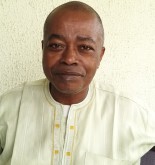By Abasiodiong Udosen
Small scale business owners in Akwa Ibom are surmounting many huddles and are on the way to creating sustainable brands while delivering value in many unique ways.
Accidental shoemaker
As a child, Oduduobong Ndiok, a native of Oruk Anam Local Government Area in Akwa Ibom State, grew up with a strong desire to explore the seas. Determined to pursue his dream, he enrolled at the Maritime Academy of Nigeria (MAN) in Oron, where he studied Nautical Science.
After completing his national service in 2013, Oduduobong was standing on the cusp of a new beginning. The call of the seas not only tugged at him but also filled his heart with the promise of adventures beyond his imagination. Eager and overflowing with passion, he was ready to chart a course through uncharted waters – ready to embrace the unknown and chase dreams as vast as the ocean itself.
One fateful day, he left home for Lagos, where there were lots of opportunities in seafaring. That journey would forever alter the course of his life.
“I stayed in Lagos for about two years without finding a job,” Oduduobong recalled with a wry grimace crossing his face. “And on my way back to Akwa Ibom, I had an accident that nearly took my life.”
While many of the passengers on the bus tragically lost their lives, Oduduobong was fortunate to survive. However, he spent the next year and a half in the hospital undergoing multiple surgeries. When he was finally discharged, he faced a new reality—he could no longer walk freely.
Confined to crutches, he would often hop outside to sit with his landlord’s son, who was making shoes. To cure his boredom, he started taking pictures of the shoes and sharing them on social media. Not long after he posted the pictures, his friends and former colleagues who were aware of his misfortune started making orders for the shoes.
“When they made an order, my landlord’s son would make the shoes and money started coming,” he recalled. “I thought to myself that if I can do the shoes myself, then I can make more money. That was when I had the interest to go into shoemaking.”

Oduduobong Ndiok, CEO, Papzeshoes, Uyo, Akwa Ibom State
What started as a simple pastime quickly transformed into a prospective career path. Despite being restricted to crutches, he was eager to learn the art of shoemaking. He indicated an interest to become an apprentice to his landlord’s son, the shoemaker.
Seeing Oduduobong’s seriousness, the young man obliged him but asked for a little payment he said was “just for culture.” Still on crutches, Oduduobong began his adventure into the world of shoe making.
“I worked with him for about two years,” Oduduobong recalled. “By the time I was done, I no longer needed crutches, so I went to Aba for advanced training in shoemaking.
“My landlord’s son wasn’t making regular shoes; he specialized in pams and sandals. I spent about a year in Aba, honing my skills, and then returned to Uyo to start my own brand, Papzeshoes.”
You can also read: Customs Comptrollers Implicated in N15bn Scandal as CG Adeniyi Waives Duties on 500 NASS Luxury Vehicles
Serving both local and foreign clients, the accidental shoemaker has painstakingly created more than 5,000 pairs of shoes since 2018. His products have graced the feet of the mighty in society, and his reputation has increased.
Yet, despite his measured success, he’s been struggling to master the business side of shoemaking. To realise the full potential of his growing brand, he needed to find that elusive, missing piece—the key to turning his shoemaking ability into a profitable business.
Chased by insurgency into opportunity
While Odudubong’s journey into shoemaking was quite literally an accident, Mitchel Chukwudi’s path to becoming a fruit juice manufacturer began after he fled from relentless insurgents in Northern Nigeria. Both stories are about unexpected beginnings, where life’s twists culminated in the birth of something entirely new and unplanned.
Although his parents are from Ngo Okpala in Imo State, Mitchel is a true Lagosian, born and raised in Nigeria’s bustling commercial hub. Cosmopolitan in nature, he went to study Crop Production at the University of Maiduguri, Borno State in 2011.
Shortly after settling into the programme, Boko Haram laid siege to Maiduguri, killing people and setting homes ablaze. Unable to cope with the escalating crisis, Mitchel began searching for admission in more peaceful parts of Nigeria.
“It was my uncle who told my dad that Uniuyo was available,” he recalled. “When we tried, we saw that it was the only university in the South-South/South-East open to receiving non-indigenes and the process was very easy for me.”
Upon his arrival, the then Head of Department (HOD), Dr. Idem, whom Chukwudi described as “a very hospitable man,” welcomed him warmly and gave him unwavering support, just like he did for every other student.
While in school, Mitchel found that many farmers in Akwa Ibom, particularly those in rural areas, were losing a substantial portion of their fruits and vegetables post-harvest due to limited access to markets. He began thinking ways to reduce these losses and add value to local produce.

Mitchel Chukwudi, MD/CEO of Fruitzy, a food processing firm in Uyo, Akwa Ibom State
During his mandatory industrial training, he went to Songhai Farm in Port Harcourt, Rivers State. There, he learned the art of transforming fresh fruits into juice, among other valuable skills. This led Mitchel to conceive and create Fruitzy, a fresh fruit juice brand that has quickly become one of the best in Akwa Ibom. Known for its consistent taste, quality, and positive impact, Fruitzy stands out as a shining example of what local ingenuity can achieve.
“I have been able to reduce post-harvest losses in Akwa Ibom and it is a problem I have been trying to solve,” he noted. “Although it is capital intensive, we have been consistent in the process and we have added value to fresh fruits and vegetables not only in Akwa Ibom but also in Cross River and Rivers states. We have impacted on a lot of farmers and market women.”
Despite its great taste, high quality, and loyal customer base, Fruitzy is struggling to build a strong market presence and lacks the network needed to fully exploit the opportunities within and outside the state.
From an observer to a poultry farmer
Iyakntie Obot, 34, from Ukana Uwa West in Essien Udim Local Government Area, recalls his early experiences with poultry farming. “When I was younger, my father kept about 100 broilers, and I was always admiring them,” he told our correspondent, his eyes lighting up with emotion. “He would tell us to go and put water for the birds, sweep, and do things like that.”
As he grew older, Iyakntie’s admiration deepened, especially when he began helping his uncle’s wife, who had a poultry farm with over 1,000 birds—a rare feat at the time. “We would come over to assist her with de-beaking the birds and cleaning the litter,” he recalled. “That’s when I started developing a real passion for poultry farming.”
He nursed the ambition even when he studied Business Administration at the University of Calabar, Cross River State. Instead of waiting for a government job after graduation, Iyakntie, whose name means, “let me be,” chose to start his own poultry farm in Ukana Uwa West.
“I started with 100 birds,” he said proudly. “I approach this business as if I will not see tomorrow. For example, I awoke about 6 a.m. today to begin cleaning the litter, and I’ve been at it till nearly 1 p.m. This is because I am passionate about the business, and I have no regrets,” he told our correspondent at the farm.
With almost 500 birds and a piggery holding 16 pigs, including piglets, Iyakntie has been dealing with the unrelenting consequences of inflation, which has driven up the cost of feed and other vital supplies needed to run his farm.
Despite having a degree in business administration, he knew he lacked the practical, hands-on experience needed to make his farm truly profitable. Not having quick fixes for his problem, Iyakntie has been working tirelessly to keep his farm. He held out hope that things would improve.
Struggling in the village
Living in Ndot, village in Oruk Anam Local Government Area, Nneka John had always known the value of hard work. Although life hasn’t been very easy for her and her family, she is determined to help her hubby, a petty trader, in taking care of their three children. Instead of waiting for him to shoulder all their household expenses, Nneka decided to take matters into her own hands.
She started a small poultry farm at the back of their family compound. Nneka, whose name literally means, “My mother,” tended to her poultry with care and dedication. As the birds flourished, so did her contribution to her family’s upkeep. Each egg laid and each bird sold brought her family one step closer to a brighter future.
You can also read: How Governor Umo Eno Spent a Whooping N18bn on “Happy Hour” (Part 1)
However, Nneka’s goal went beyond just providing for herself and family. Her dream was to grow her poultry farm into something much larger—an enterprise that would not only generate more revenue but also allow her to help the poor in her community.

Nneka John of Eka Emma Ago-Multipurpose Corporative Society and Poultery Farmer from Oruk Anam LGA
With this idea in mind, Nneka came together with 14 other women to start a cooperative society, Eka Emma Agro Allied Services. With Eka Emma, the women pooled their resources and shared their knowledge, with the aim improving mot only their businesses but also their families and community.
For Nneka, the cooperative is more than simply a business opportunity; it is an expression of her ambition and the promise of a brighter future.
From nursing/midwifery to agro-processing
On her part, Alicia Etukudo has spent not less than 40 years working in different hospital departments and wards providing care for the ill and dying. She has seen it all, working in the public health sector before moving into private practice when her husband founded the Samaritan Clinic in Eket, a thriving oil town in Akwa Ibom State. Alicia threw herself in, working to transform her family’s healthcare facility into something to be proud of.
However, after years in family clinic, Alicia craved a change. She couldn’t resist the urge to try something new. This wasn’t about going on sabbatical. It was a choice that drastically altered her career. Alicia left nursing and started processing local vegetables.
This wasn’t an overnight switch. Alicia had been quietly dehydrating vegetables for years, using them to make sumptuous meals with rich, appealing tangs. Her long-standing passion for good and safe food pushed her to turn her culinary pastime into a successful business.
Alicia now owns Fresh & Natural Farms Limited, Eket, an agro-processing firm registered with Nigeria’s National Agency for Food and Drug Administration and Control (NAFDAC) and the United States Food and Drug Administration (FDA). She sells her well-packaged products within and outside Nigeria.
“You are here in the factory where we process dehydrated vegetables,” she said, gesturing to the bustling activity around her. “We get the vegetables from different farms owned mainly by rural women.”
But her company offers more than just vegetables. It also produces fish powder sourced from an island close to the Atlantic Ocean. “The fish come from rural women too,” she added.
One of the key points Alicia highlighted repeatedly was the quality and source of her raw materials. “Our raw materials are sourced from the natural environment, so we can say they are organic,” she noted.
Like many entrepreneurs profiled before, Alicia feels a lingering sense of emptiness and a strong desire to deepen her knowledge about her business. She wants to grow, scale, and access larger markets and had considered taking a course at one of Nigeria’s elite resource centers, the Lagos Business School, but the opportunity never materialised.
Different businesses, same problem
After interviewing Oduduobong, Mitchel, Iyakntie, Nneka, and Alicia, we found that these entrepreneurs share a common passion to make money and to serve their communities. However, they also face challenges in accessing larger markets and lack the knowledge on how to achieve sustainable growth and profitability.
The real question is, how will these entrepreneurs overcome the challenges that threaten their competitiveness, profitability, and sustainability? …. To be continued in Part II




